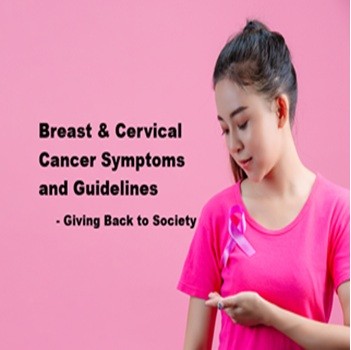 Skills Hoster
Skills Hoster
-
Invitation for Young Medical Professionals those who need Hourly JobsDescription
Guidelines for the Early Detection of Cancer:
Screening tests are used to find cancer before a person has any symptoms.
Symptoms of Breast Cancer:
The most common symptom : A new lump or thickening in the breast or underarm.
• Breast changes: Changes in the size or shape of the breast.
• Skin changes: Dimpling or puckering of the breast skin (sometimes described as an "orange peel" texture). Redness, scaliness, or swelling of the breast skin.
• Nipple changes: Nipple retraction (turning inward). Nipple discharge (other than breast milk), which may be bloody. Changes in the appearance of the nipple, such as a rash or scaliness
• Breast pain: Although breast pain is often associated with other conditions, persistent breast pain should be checked.
• Swelling of all or part of a breast: Even if no lump is felt
• Swollen lymph nodes: Swollen lymph nodes under the arm or near the collarbone.
Important Considerations:
• Not everyone with breast cancer will experience all of these symptoms.
• Many of these symptoms can be caused by conditions other than cancer.
• Early detection is crucial. If you notice any changes in your breasts, consult a healthcare professional promptly.
• It is very important to get regular mammograms, as recommended by your doctor
Screening Guidelines:
• Women ages 35 to 45 should have the choice to start annual breast cancer screening with mammograms (x-rays of the breast) if they wish to do so.
• Women age 46 to 55 should get mammograms every year.
Symptoms of Cervical cancer:
Common Symptoms:
• Abnormal vaginal bleeding:
• This can include bleeding between periods, after sexual intercourse, or after menopause.
• Heavier or longer menstrual periods than usual.
• Unusual vaginal discharge:
• This may be watery, bloody, or have a foul odor.
• Pelvic pain:
• Pain during sexual intercourse.
• Symptoms of Advanced Cervical Cancer:
As cervical cancer advances and spreads, additional symptoms may occur, including:
• Back pain
• Leg pain
• Swelling in the legs
• Fatigue
• Weight loss
• Loss of appetite
• difficult or painful urination, or blood in the urine.
• difficult or painful bowel movements, or bleeding from the rectum.
Remember: It's crucial to remember that these symptoms can also be caused by other conditions.
Screening Guidelines:
• People under age 25 should not be tested because cervical cancer is rare in this age group and should starts only after 25
• People between the ages of 25 and 65 should get a primary HPV (human papillomavirus test)
 PhotosBC
PhotosBC
 InfoGiving Back to Society
InfoGiving Back to Society
Guntur, India16.03.2025 (226 days ago)Guntur, India
Zip/Postal Code 522006  Rate0 votes
Rate0 votes
